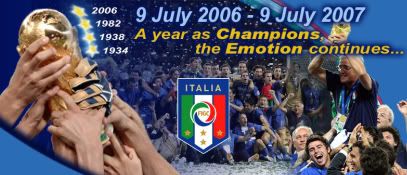
True, in football, defensive solidity has been the key to Italian success, but they have always managed to lace in a player or two with the special touch of magic.
However, Italy now has a newly-crowned world champion team which has trimmed away the dash and panache to a minimum, replacing it with all the efficiency, functionality and workability of a diesel-engined people carrier.
Giuseppe Meazza is revered to this day from the team that lifted the trophy in 1934 and 1938, as is coach Vittorio Pozzo.
The beaten finalists in 1970 boasted the likes of Gigi Riva and Sandro Mazzola, the 1982 champions had Paolo Rossi as their talisman, and Marco Tardelli's celebration as their icon.
Despite possibly the worst penalty in history in the final shoot-out against Brazil in 1994, Roberto Baggio's sublime skill is still cherished in Italy, while Roberto Donadoni's trickery and Paolo Maldini's grace also decorated the Azzurri in America.
But from Germany 2006, Fabio Cannavaro will be remembered for his rock-like defending, and Gennaro Gattuso for his tireless work in midfield.
Gabriele Marcotti, the London correspondent of Corriere dello Sport says that Italians are more than willing to forgive any shortcomings in the team's flair department for success. He wrote: "There are no real stars in this team, but they have been a much more confident unit and credit for that has to go to Lippi. The players can also take credit as they adapted to the changes Lippi made as the competition went on. Some of the big name players like Francesco Totti weren't happy but were prepared to conform for the greater good of the team."
Perhaps the biggest personality to emerge from Italy's World Cup is coach Marcello Lippi, who cast the team in his own image. That is in keeping with the past, where Italian coaches have been larger than life characters, lauded or lambasted depending on their fortunes.
Pozzo remains the only man to coach teams to two World Cup victories, while 1982 winner Enzo Bearzot is held in great reverence. So what of Lippi, the cigar-chomping, cool-hand Luke?
Marcotti says: "Despite his success, Lippi isn't necessarily somebody you embrace wholeheartedly. Enzo Bearzot was a much-loved figure, but he fell out with the press before the tournament and banned the players from speaking. He won the public and the media over by winning the World Cup. Arrigo Sacchi was well-respected in 1994, but he wasn't easy to deal with and not everybody warmed to him."
Since reaching the World Cup final in Mexico in 1970, Italy have undergone a strange cycle of success. Finalists in 1970, winners in 1982, finalists again in 1994, and winners again in 2006, it is a cycle that hints it takes 12 years to build a successful Italian team.
"I think that's just coincidence," says Marcotti. "For my money, the best Italian team I've seen in my lifetime was the team that was beaten in the semi-final by Argentina in 1990. The 1982 victory was our first for 44 years and came completely out of the blue," says Marcotti, recalling a campaign as tortuous as a Dolomite mountain road where Italy scraped through from their group, but were transformed by Paolo Rossi's hat-trick in the win over Brazil.
"The popularity of the team grew as they progressed in the tournament, whereas this time I think people rallied round from the start. This was a good team going into the tournament, possibly the best-fancied of all the European teams, and let's not forget they played most of the tournament without arguably their best defender, Alessandro Nesta."
And that is another virtue of a more functional vehicle. Spare parts are easier to slot in.

No comments:
Post a Comment